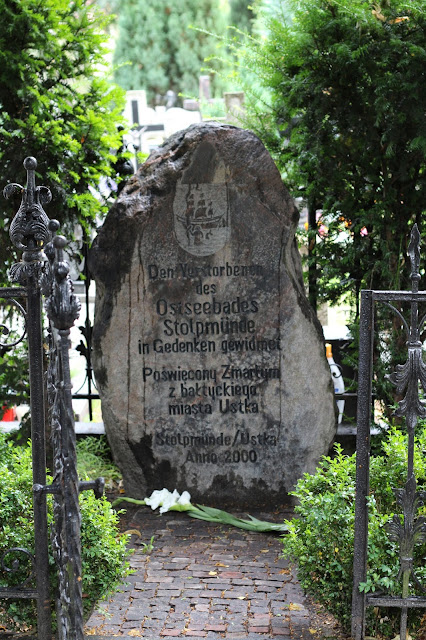 |
| Friendly seagull in Ustka |
Some of my relatives are buried in Ustka and perhaps also in Slupsk, but the old German cemeteries have been destroyed and replaced with a new Polish one. There's a newish memorial at the cemetery in Ustka to all the dead. I placed a flower there in memory of some family members who died on the refugee trail, or were deported to labour camps, or shot themselves when the Russians arrived.
There's no doubt that the end of the war was terrible for the Germans here, from the snowed-in refugee trail to the mass rapes and killings by the Red Army. On the other hand, it annoys me that this has turned into such a big political issue in modern-day Germany, with certain groups campaigning for a memorial and museum in Berlin for the Germans who were displaced from the East. I've also met quite a few Germans here who insist on referring to all the towns and regions by their old German names. It's understandable if they're elderly people, but as for younger Germans who keep talking about "Ostpreussen"... come on guys, it's Poland now!
Having said that, I feel that Polish-German relations have generally improved a lot. The locals have even restored some of the German inscriptions in churches, like this one from 1764 in Darlowo, which is nice.
 |
| German prayer in a church in Darlowo (Rügenwalde). |
Walking through Slupsk and Ustka was also a reminder of all the horrors that happened before the arrival of the Red Army, and which some of the old-homeland-nostalgia crowd are less keen to remember. The synagogue of Slupsk, for example, was destroyed in 1938. Half of the Jewish population emigrated, and most of the others were deported. There's no longer a Jewish community in Slupsk, nor in any of the dozens of Baltic towns I passed on my two-week trip.
 |
| Memorial where the synagogue of Slupsk used to be |
 |
| Memorial to the deported Jews of Slupsk |
And then there's the suffering of the Poles. When I was looking for my relatives' graves, I started talking to an elderly Polish lady who spoke excellent German. She was very friendly and tried to help me find the old part of the cemetery. I complimented her German, and she said rather drily: "I had very thorough schooling from '39 to '45." She was from the Polish corridor that used to separate East Prussia from the rest of Germany, and which was brutally occupied in '39.
So… lots of sad history, but a hopeful present. The best moments of this trip were not about the past, but about new discoveries and new friendships. We met such warm and friendly Polish people along the way, saw stunning scenery, charming villages and beautiful gardens. It's been really nice getting to know this country, which is so full of energy and hope. Oh, and I finally learned a bit of Polish! Look forward to practicing it next time I shop at a sklep in London.




No comments:
Post a Comment